Мы продолжаем напряженно работать, чтобы улучшить наш сайт и перевести его на другие языки. Русская версия этой страницы еще не совсем готова. Поэтому мы представляем здесь пока английскую версию. Мы благодарим вас за понимание.
Коровьев
Context
«My name? Well... let's say it's Koroviev», he says to Nikanor Ivanovich, the chairman of the tenants' association of the building on Bolshaya Sadovaya street no. 302-bis.
Koroviev usually wears a checkered suit, a jockey's cap and a pince-nez. Sometimes - at Patriarch's Ponds - he introduces himself as a choir-master, sometimes as the interpreter-translator of a foreign consultant who «needs no interpreting». He's more quiet than his companions Behemoth and Azazello, but he's a masterly intriguer with propositions as sound as possible, but with an amazing unsoundness in his elocution.
Prototypes
The character Koroviev reminds us of a number of literary prototypes. The description of Koroviev's dressing refers to the devil visiting Ivan Fyodorevich Karamazov in the novel The brothers Karamazov written by Fyodor Mikhailovich Dostoevsky (1821-1881). His profession of choir master connects him to Kapellmeister Johannes Kreisler, a character of Ernst Theodor Amadeus Hoffman (1776-1822). This Kapellmeister or bandmaster had a cat for companion . This cat was called Murr and it was of a special kind. Both characters appear in the complex satirical novel Lebens-Ansichten des Katers Murr nebst fragmentarischer Biographie des Kapellmeisters Johannes Kreisler in zufälligen Makulaturblättern (1819-1821), in two volumes. A planned third volume was never completed.
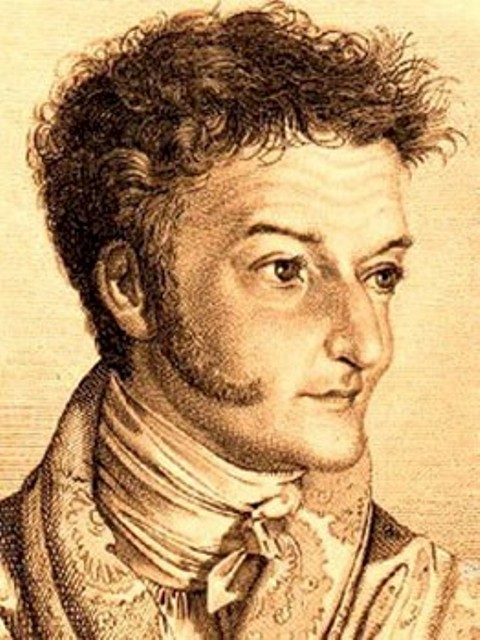
Эрнст Теодор Амадей Гофман
There are different opinions about which real person could be the prototype for the character Koroviev. Moreover, Mikhail Bulgakov may have combined the characteristics of different persons in this one character. One thing is for sure: we did not have to search among the numerous kinds of mythical demons. Koroviev stands out because of his irony and his tricks, but he's never as aggressive as Behemoth and Azazello.
Some authors argue that Lyubov Yevgenyeva Belozerskaya (1895-1987), the second wife of Bulgakov, suggested that a certain Ageich, a locksmith and plumber who married their housemaid Marusha when they lived in Bolshoy Pirogovsky ulitsa no. 35, would have been the model for Koroviev. She would have suggested it in her book My life with Mikhail Bulgakov from 1968. Belozerskaya had written that this Ageich, «a man for all kinds of chores», had sung in a choir and that he was hard to stop when he spontaneously began singing hymns, but she did not explicitly refer to the character of Koroviev.
Someone who might qualify as a model for Koroviev is Vasily Ivanovich Shverubovich (1875-1948), an actor of the Moscow Art Theater MkhAT, who played under the pseudonym Vasily Ivanovich Katshalov. Kachalov came from Vilnius, Lithuania, and liked to sing with a striking accent. He had an irresistible charm on stage with his pleasant voice, was very eloquent and intelligent and had a great sense of humor. He was tall - 1.85 m - and skinny, and he wore a pince-nez because he was nearsighted.
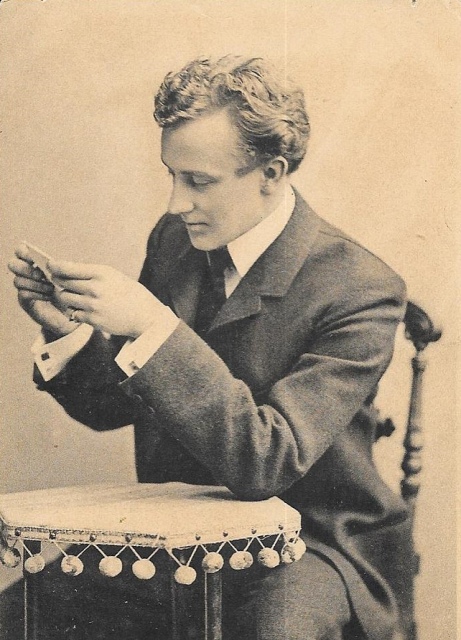
Василий Иванович Качалов
Yet another actor and director of the MkhAT, Grigory Grigoryevich Konsky (1911-1972), also had some characteristics reminding to the Koroviev which Bulgakov described. He belonged to the circle of friends of the Bulgakovs and was considered a «master of irony and humor». Shortly after the death of Bulgakov in 1940, he would start teaching at the famous Moscow theater school GITIS.
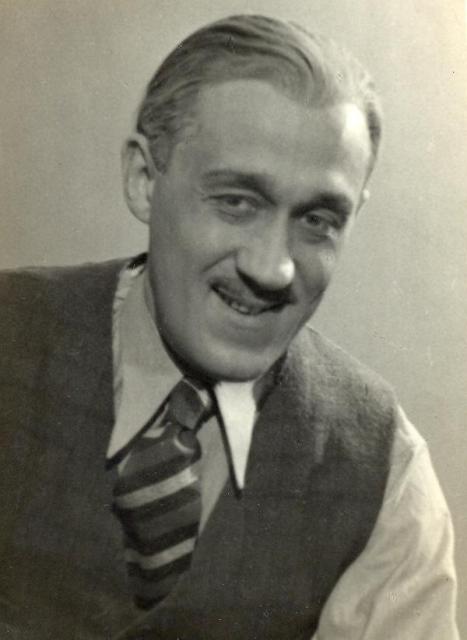
Григорий Григорьевич Конский
In some other publications it is suggested that Koroviev would be based on the poet Osip Emilevich Mandelstam (1891-1938) or on the writer Mikhail Yuryevich Lermontov (1814-1841), but we did not find any concrete arguments for any of these.
The name Koroviev
The name Koroviev is derived from the Russian word корова (korova) which means cow. Which reminds us of the Golden Calf with which Mephistoteles celebrates the omnipotence of money in the opera Faust of Charles Gounod (1818-1895).
According to Valeri Rublev of the internet magazine Yavarda, Bulgakov may have taken the name Koroviev from the first issue of the magazine Коровий безбожник [Korovy bezdozhnik]. Коровий is the adjective of корова [korova] or cow, and безбожник means godless or atheist. It is a rather strange title for an anti-religious magazine that had six issues from April to August 1925. Bulgakov is known to be very annoyed by the many atheist magazines in the Soviet Union, but there is no concrete indication that he would have based the name of Koroviev on it.
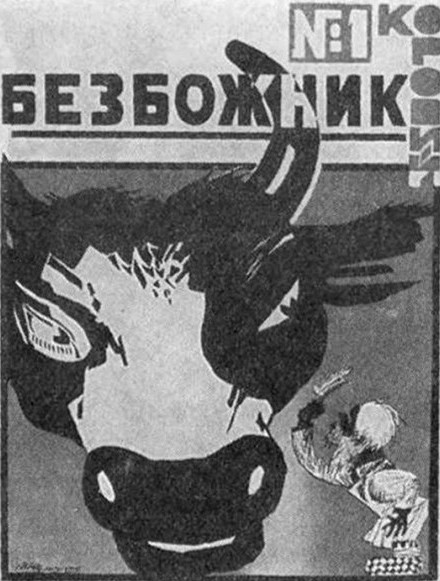
Коровий безбожник № 1
His second pseudonym, Fagott, which Woland allotted him during the show at the Variety Theatre, connects him to the many musical themes in the story. His appearance makes us think of the long wind instrument which can be two meters long and which has a wide register. Fagott has got the capacity to change his voice.
Transformation
When the demons are transformed again to their original form Koroviev changes in a dark-violet knight with a most gloomy and never-smiling face. This knight once made an unfortunate joke, according to Woland, the pun he thought up, in a discussion about light and darkness, was not altogether good.
This reminds to the knight Samson in the novel Don Quichote by Miguel de Cervantes Saavedra (1547-1616), which Bulgakov adapted to a theatre play. In that story Samson disguises as the Knight of the White Moon who duels with Don Quichote and wins, after which Don Quichote falls into melancholy and dies.
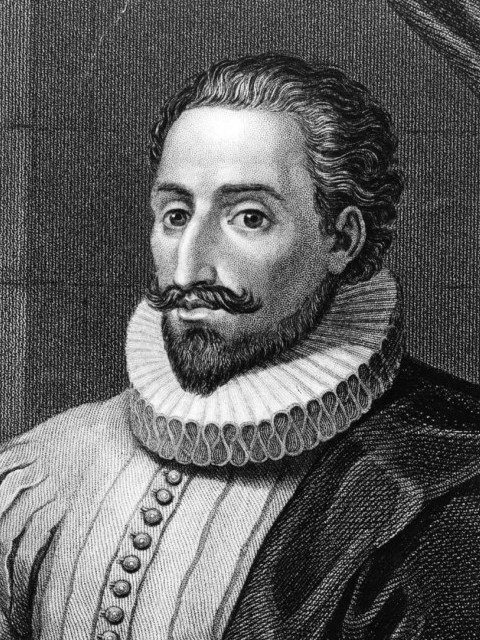
Мигель де Сервантес
The description of Koroviev's clothes, the golden chains of the bridle and the use of the word knight could have been a reference to Freemasonry, just like the pun about the light and the darkness almost certainly is one.
In 1873, doctor Albert Mackey (1807-1881), a prominent Freemason from Charleston, South Carolina, wrote in his Encyclopedia of Freemasonry: «Freemasons are called the Sons of the Light, because they are in possession of the true meaning of the symbol. It is stated that the uninitiated who have not received this knowledge are living in darkness.» While a Mason is making his way up through the different degrees of the Lodge, he will receive the true light, and he is considered superior to people to whom the mysteries of Freemasonry have not beeen revealed.
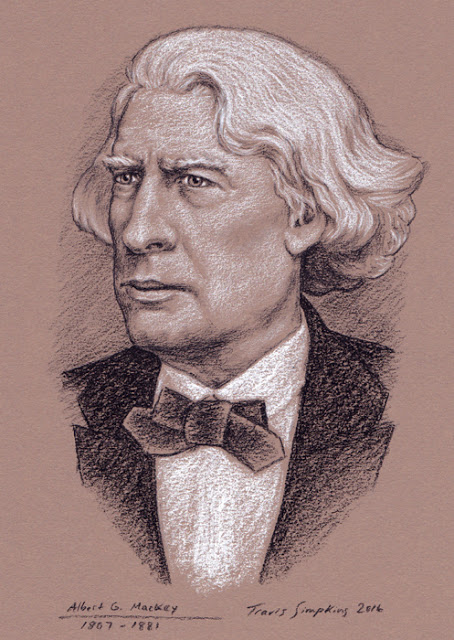
Альберт Галлатин Макей
It is extremely inappropriate to make jokes about teachings like this. Article 16 of the Masonic Etiquette mentions, under the title No practical jokes nor off-color stories: «Why? The great lessons of Masonry, which are taught by our ritual, should never be demeaned by levity or pranks. The lodge room is not a proper location for the telling of practical jokes, pranks, horseplay nor off-color stories.»
The interest of Bulgakov for Freemasonry can be explained by the fact that, in 1903, Afanasy Ivanovich Bulgakov (1859-1907), theologian and church historian, and the father of Mikhail Afanasievich, had written an article about Modern Freemasonry in its Relationship with the Church and the State, which was published in the Acts of the Theological Academy of Kiev. Mikhail Bulgakov refers more than once to Freemasonry in The Master and Margarita.
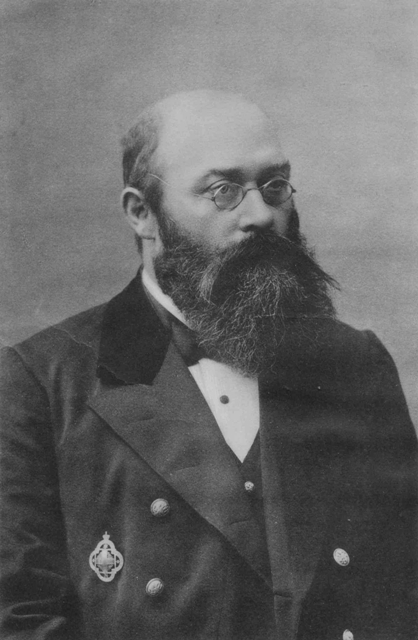
Афанасий Иванович Булгаков




